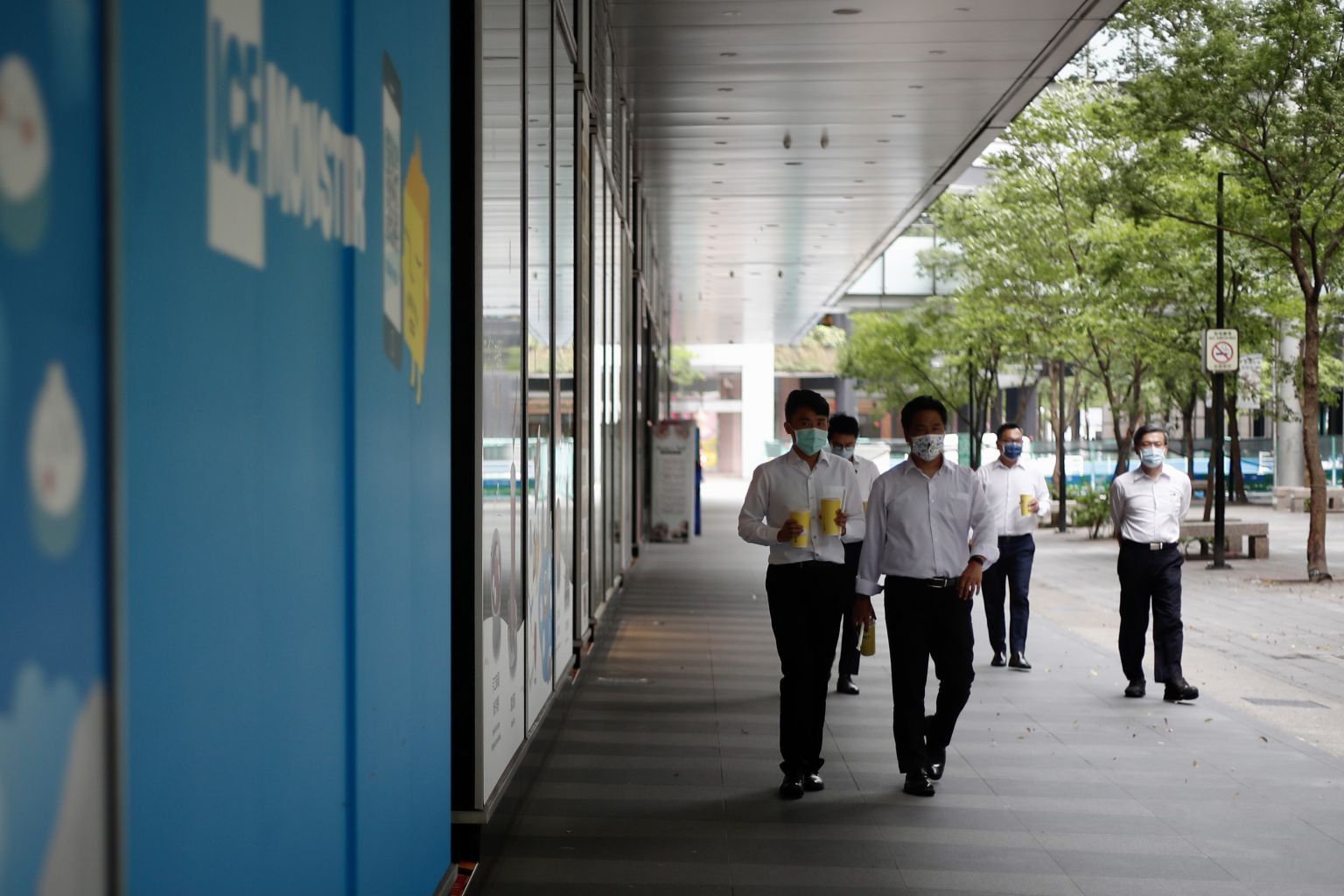Many in Taiwan still forced to work in office amid Covid-19 pandemic
Sign up now: Get insights on Asia's fast-moving developments

Office workers walk with their takeaway food and drinks in Taipei, Taiwan, on May 24, 2021.
PHOTO: EPA-EFE
TAIPEI - While much of the world has adapted to working from home after almost 1½ years of the Covid-19 pandemic, workers in Taiwan are taking this as yet another unfamiliar challenge brought about by the outbreak.
Even as major technology companies like Google quickly directed employees to work from home early this month, the lack of a lockdown in Taiwan means many companies have refused to do the same, not wanting to suffer any loss of business.
Taiwan has been put on alert level three of a four-tier system, which includes asking people to work from home where possible.
However, businesses are reluctant to change the entrenched culture of presenteeism, where workers must show up to be counted.
Taiwan's health authorities do not want to impose a lockdown yet, and are asking people to stay indoors if they can, with no more than five people for indoor gatherings and no more than 10 at outdoor ones.
Taiwan on Saturday (May 29) reported 320 new and 166 previously unreported local cases. It was the 14th consecutive day that new local infections have exceeded 200 on the island.
Mr Liu, an investment banker who works at E. Sun Bank, one of Taiwan's major banks, said that his company was caught by surprise by the latest outbreak and that the management should have been prepared for such a scenario a year ago.
The 31-year-old, who asked to be identified by his surname only as he was not authorised to speak to the media, said: "We should have all been given access to use the company system on our own computers at home, but the management only realised this month that nobody had been given access."
This meant he and his colleagues could not work from home. Instead, teams are working in different buildings and on different floors.
When a co-worker's wife was diagnosed with Covid-19, the people working on the same floor had to be sent home to try to work remotely.
"They still don't have system access, so people at the office are stuck doing double the workload," said Mr Liu, who thinks the company is trying to keep operations going without forking out extra money to resolve the technical obstacles.
Banks are not the only organisations that are ill equipped for their employees to work from home amid the outbreak.
Teachers at public, private and cram schools, where children go after school to catch up on schoolwork, are also scrambling to keep classes going for their students with the summer break still at least a month away.
Ms Lai Ya-li, 30, fashioned a makeshift tripod using a sticky tape dispenser as she filmed herself for classes for the cram school she worked at.
"But parents are beginning to complain because pre-recorded videos mean no teacher-student interaction," she said.
Instead of offering support for teachers to switch to live-streaming, her company instead asked teachers to go to the office to help keep the place tidy and do paperwork. It cited budget limitations for not being able to supply live-streaming equipment to teachers.
"I think the government should step up and implement stricter guidelines for company managements to follow, or the employees are the ones suffering," said Ms Lai.
Small businesses also do not have the resources to sell their products online.
Ms Lee Yi-jen's parents own a construction material store, and have kept the store open despite the rapidly worsening Covid-19 situation in New Taipei City's Banqiao district, where many cluster infections were reported.
"I'm really worried about them, but they say they still have orders to fulfil and don't want business to stop," said Ms Lee, whose parents are in their 60s.
She said she had hoped her parents would implement no-contact delivery or a pick-up schedule for customers, going by appointments only.
But her parents declined, saying it was too much trouble.
Television companies have continued to film dramas as viewership grows, with some production crew disregarding even their own company's rules to film only in open spaces.
"We're still filming indoors... and have long gone over the limit of five people gathering indoors," said Ms Wong, 32, an actress who asked not to publish her full name for fear of repercussions. She is starring in a TV show that is being broadcast islandwide.
The crew needs to keep filming otherwise "there will be no income for any of us and the show will flop", she said.
But she felt safety measures need to be taken to prevent the spread of the virus.


